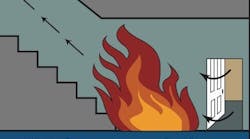LARGO - Firefighters here say they want to continue answering all calls for emergency medical help even though a new county plan relieves them from responding to certain low-level calls.
They're also asking that Largo city commissioners rescind their support of the plan, which is scheduled to start June 1.
"It is the opinion of the Largo Professional Firefighters Association that this is wrong and will cause undue harm to the citizens of the city of Largo," union president Dale Rosko and secretary-treasurer Macho Liberti wrote in a letter Thursday to the mayor and commissioners.
"Upon becoming a firefighter for the city of Largo, we all stood before the commission and swore an oath to protect the Largo citizenry. Not responding when our citizens are in need violates that oath, no matter how minor a dispatcher interprets the call to be."
Largo fire Chief Mike Wallace, who advised his commission to support the plan, said he understand and agrees with the firefighters' belief that it's their responsibility to serve residents. He also agreed that residents will be getting a lower level of EMS service than they currently receive. But Wallace intends to advise the commission to continue supporting the plan.
"In an ideal world, I would be on their side," he said. But it's not an ideal world, he said.
Wallace said he has at least two compelling reasons for his stance. First, the system belongs to the county. Pinellas contracts with the county's 18 fire departments to run EMS calls. Pinellas, as the contractor, has the right to decide what performance it wants from those who contract to provide EMS.
Second, Wallace said he does not believe the plan will ever be activated. The June 1 starting date was picked to give time for an independent study of the EMS system to be finished. It's possible, he said, that the study will suggest major changes to the system that could make the new response plan unnecessary.
Under Pinellas' current emergency medical services system, most calls for medical help get an automatic full response: Two to four firefighter/paramedics are sent to be first on the scene to provide immediate help and assess the situation. Also sent is an ambulance with two more paramedics who will, if necessary, take the victim to a hospital. Firefighters must be on scene within 7½ minutes 90 percent of the time.
Under the new plan, approved earlier this month by a 4-3 vote of the County Commission, only an ambulance will be sent to certain low-level calls that include such things as some falls, hiccups and insomnia. Not only will fewer paramedics show up, but they'll have longer to get there - up to 15 minutes.
Under the original plan, firefighter/paramedics would not have been notified of those calls, but that has been changed. Firefighters will continue to be told of the calls and the city or district will decide whether they want their employees to respond.
The plan, county officials say, will save money and increase efficiency while freeing up firefighters for more serious calls.
The plan has been widely opposed by fire chiefs and elected officials from cities and fire districts who say the idea is good but the county is not doing it correctly. The Largo union's stance is apparently the first time frontline firefighters have formally weighed in on the debate and asked to continue running all EMS calls. Their objections to the plan echo some of those raised by the chiefs, cities and districts:
* The fear that a caller will not accurately report the details of the medical emergency. That could mean that someone who needs immediate help will not get it. Or that those in pain will have to suffer longer while waiting for an ambulance when Largo generally responds in four to six minutes.
"We have all responded to calls that have not been properly dispatched," Rosko and Liberti wrote. "The blame does not necessarily fall on central dispatch. Stress is the real culprit, the stress that ensues when someone is placed in a situation that has led them to call 911 in the first place."
* The fact that Largo taxpayers will not be getting what they're paying local taxes for.
"Largo citizens faithfully pay their taxes to have their fire department's services at their beck and call. They will still be continuing to pay their taxes when we are sitting at the fire stations, waiting to respond to a call while only Sunstar, a private for-profit company, responds," Rosko and Liberti wrote.
* The likelihood that the county will use the reduced number of responses to pay Largo less for its EMS service. The Pinellas EMS system is funded by a countywide property tax, and ambulance user fees are paid by the federal and state Medicare and Medicaid programs, private insurance and out-of-pocket payments. Pinellas divides the money up among the 18 fire departments, the private ambulance company and itself to run the system.
Anne Lindberg can be reached
or (727) 893-8450.
Copyright 2013 Times Publishing CompanyAll Rights Reserved






